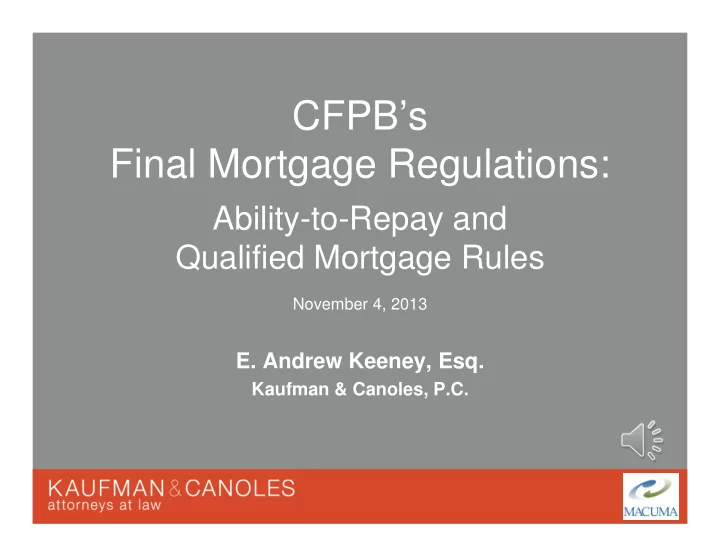

CFPB’s Final Mortgage Regulations: Ability-to-Repay and Qualified Mortgage Rules November 4, 2013 E. Andrew Keeney, Esq. Kaufman & Canoles, P.C.
Ability-to-Repay and Qualified Mortgage Rules
E. Andrew Keeney, Esq. Kaufman & Canoles, P.C. 150 West Main Street, Suite 2100 Norfolk, VA 23510 (757) 624-3153 eakeeney@kaufcan.com
History Proposed Regulation: 474 pages Comments Received: 1800 Final Regulation: 804 pages Effective Date: January 10, 2014 Number of Days Remaining: 67 Let’s Roll!
Will the Ability to Repay Rule be Workable for Credit Unions?
Overview • Applies to ALL credit unions offering mortgage loans • Must determine a consumer’s ability to repay a mortgage before making the loan • Regulation covers all consumer mortgages except home equity (HELOCs), timeshare plans, reverse mortgages or temporary loans • Ability-to-Repay determination and underwriting considerations • Underwriting considerations • Qualified mortgages and a “Safe Harbor” • Exemptions
Ability to Repay and Qualified Mortgage Rule January 2013 • CFPB amended Regulation Z (Truth in Lending Act) by issuing new regulations governing mortgage lending requirements, known as the “Ability-to-Repay and Qualified Mortgage Rule” Effective date: January 10, 2014
Ability to Repay and Qualified Mortgage Rule • Regulation Z currently prohibits lenders from making a higher-priced or higher-cost mortgage loan without regard for the consumer’s ability to repay the loan • New Rule establishes minimum requirements for all lenders to make an ability-to-repay determination prior to extending a residential mortgage loan • New Rule offers Safe Harbors from liability
Ability to Repay and Qualified Mortgage Rule • New Ability-to-Repay Rule applies to all closed-end mortgage loans (home purchases, refinancing, home equity loans, vacation home loans, etc.) • Does not apply to open-end credit plans, time share plans, reverse mortgages or temporary loans (i.e., 12 months or less) • New Rule goes into effect January 10, 2014 • BUT , some rule changes may be in the works
Ability to Repay Determinations (at a minimum credit unions must consider 8 underwriting factors in determining a borrower’s ability to pay)
Minimum Underwriting Factors 1. Current or reasonably expected income or assets
Current or Reasonably Expected Income or Assets Determination • Section 1026.43(b)(4) prescribes the manner in which the creditor verifies the borrower’s assets or income • May review specified records to satisfy this requirement – Tax returns – IRS Form W-2 (or similar forms) – Employer records – Government agency records (e.g., Social Security Administration “proof of income” letter)
Current or Reasonably Expected Income or Assets Determination • May review specified records to satisfy this requirement • Financial institution records • Check cashing receipts • Credit union needs to verify only the income/assets actually relied upon in making its determination of whether to extend credit
Minimum Underwriting Factors 1. Current or reasonably expected income or assets 2. Current Employment Status
Minimum Underwriting Factors 1. Current or reasonably expected income or assets 2. Current Employment Status 3. The monthly payment on the covered transaction
Minimum Underwriting Factors 1. Current or reasonably expected income or assets 2. Current Employment Status 3. The monthly payment on the covered transaction 4. The monthly payment on any simultaneous loans
Minimum Underwriting Factors 1. Current or reasonably expected income or assets 2. Current Employment Status 3. The monthly payment on the covered transaction 4. The monthly payment on any simultaneous loans 5. The monthly payment for mortgage-related obligations 6. Current debt obligations, alimony and child support
Minimum Underwriting Factors 1. Current or reasonably expected income or assets 2. Current Employment Status 3. The monthly payment on the covered transaction 4. The monthly payment on any simultaneous loans 5. The monthly payment for mortgage-related obligations 6. Current debt obligations, alimony and child support 7. The monthly debt-to-income ratio or residual income 8. Credit history
E. Andrew Keeney, Esq. Kaufman & Canoles, P.C. 150 West Main Street, Suite 2100 Norfolk, VA 23510 (757) 624-3153 eakeeney@kaufcan.com
CFPB’s Final Mortgage Regulations: Ability-to-Repay and Qualified Mortgage Rules November 4, 2013 E. Andrew Keeney, Esq. Kaufman & Canoles, P.C.
Recommend
More recommend